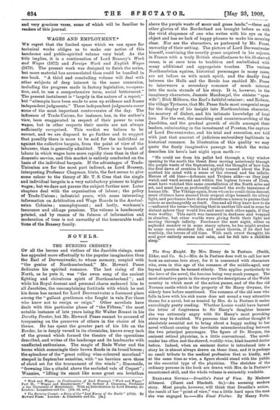WAGES AND EMPLOYMENT.*
WE regret that the limited space which we can spare for technical works obliges us to make our notice of this handsome and public-spirited volume very brief. As the title implies, it is a continuation of Lord Brassey's Work and Wages (1872) and Foreign Work and English Wages (1879). The present work was designed to finish the series, but more material has accumulated than could be handled in bne book. "A third and concluding volume will deal with ether subjects of deep interest in the same connexion, including the progress made in factory legislation, co-opera- tion, and, to use a comprehensive term, social betterment." The present instalment is " largely in the nature of a report," but "attempts have been made to sum up evidence and frame independent judgments." These independent judgments cover tome of the most important controversies of the day. The influence of Trade-Unions, for instance, has, in the author's View, been exaggerated in respect of their power to raise Wages, but in other respects their merits are not always eefficiently recognised. This verdict we believe to be eerrect, and we are disposed to go further and to suggest that possibly there is more to be said for the individual as against the collective bargain, from the point of view of the labourer, than is generally admitted. There is no branch of labour in which wages have more rapidly risen than in that of domestic service, and this market is entirely conducted on the ,basis of the individual bargain. If the advantages of Trade- Ii.nionism are for the most part indirect, as Lord Brassey, interpreting Professor Chapman, hints, the fact seems to give some colour to the theory of Mr. T. S. Cree that the single and individual bargain is a very satisfactory pioneer to higher wages ; but we dare not pursue the subject farther now. Later chapters deal with the organisation of labour ; the policy of Trade-Unions ; industrial peace, with some interesting information on Arbitration and Wage Boards in the Austral- asian Colonies ; unemployment ; and lastly, workmen's Insurance and old-age pensions. The volume is handsomely tainted, and by reason of its fulness of information and moderation of tone is not unworthy of the honourable tradi- tions of the Brassey family.






































 Previous page
Previous page